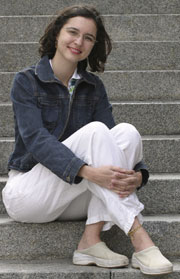
 |

|
|
 |
|
|
|||
|
Photo by Christian Fleury |
Politics inspired JMSB's Seanna Miller Business students don’t usually take much interest in student politics
— they’re focused on their aspirations in the world beyond the
campus — but it was a political protest that turned Seanna Miller
from a conventional student into an exceptional one. Her path to university wasn’t smooth. Miller grew up in Guelph,
Ont., and was in a molecular As a result, she was one of only three young Canadians hired by Johnson
and Johnson for this program, which provides placements in three key health
care companies under the J & J umbrella. Coincidentally, her first
placement will be in Guelph, where she grew up. |
|
|
|
Laura MacDonald Photo by Andrew Dobrowolskyj |
Laura MacDonald took an
alternative path to art history success With a GPA of 4.0, she has been awarded an FQRSC grant of $15,000 a
year to finance her master’s degree in art history at the University
of British Columbia. (Quebec’s Fonds Québécois de la
Recherche sur la Société et la Culture gives the grant to
students who show great research potential.) MacDonald chose to go west
rather than overseas or to the States on the advice of her Concordia professors. |
||
 Alexandra Guerson de Oliveira Photo by Andrew Dobrowolskyj |
Alexandra Guerson de Oliveira
excels at Iberian history Her doctoral work will focus on 15th-century Iberia (what we know as Spain and Portugal) and the Jewish-Muslim-Christian relations, a subject that has been poorly explored, partly because of language requirements. A scholar would need to be fluent in Portuguese, Spanish, Catalan, Arabic, Hebrew and Latin to do justice to the literature. Oliveira, a lover of language, feels up to the challenge. “It’s like
detective work,” she said. “It’s like putting a puzzle together. That’s
what attracts me to professional history — it’s the challenge.” Her route to professional history began accidentally. While she was
completing a law degree in her native Brazil she met a Canadian over the
Internet, a man who eventually became her husband. When she visited him
six years ago she took a course in English as a second language in which
she had to give a 15-minute presentation on the book The Children of
Henry VIII. It turned into an hour-long lecture, and de Oliveira knew
she wanted to become a history professor. |